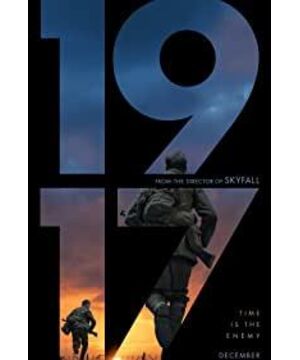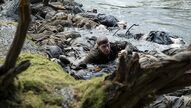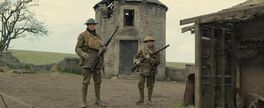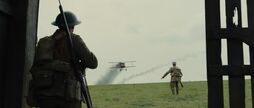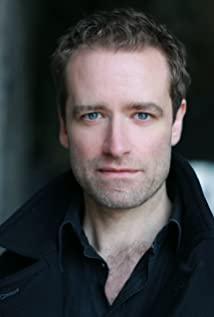On February 10 (Beijing time), the 92nd Oscar Awards officially came to an end. The movie "1917" won three awards: Best Photography, Best Visual Effects, and Best Sound Effects.
"1917" is directed by Sam Mendes, starring Dean Charles Chapman and George McKay. The main story of the movie is very simple. During the First World War, two soldiers must be assigned within a limited time. Go to the front line to serve the retreat task, otherwise the 1,600 soldiers of the Second Army Corps on the front line will fall into the trap of the German army and all die. The film revolves around the two soldiers on their way to deliver the letter. The film’s one-shot presentation allows the audience to follow the protagonist all the way immersively while watching the movie, focusing on every minute and second of their mission.
When the task is completed, the mood of the audience begins to relax. This immersive attraction is also the success of this film. This article by the poet and writer Liao Weitang analyzes the war aesthetics of "1917" in detail, and the fable constructed in it is still worth thinking about today.
Author|Liao Weitang
"1917" has become a dark horse for this year's Oscars, not only because it expresses a poignant and beautiful war aesthetics in a very poetic form, but it also constructs an allegory of disaster and redemption, even in peace. But today, which is still full of natural and man-made disasters, is also thought-provoking.
Looking back at the modern history of the West, every dark period when the plague spreads—whether it is a viral plague or a political plague, there are often fables of The Ship of Fools, including songs, poems, and paintings. The most famous is Bosch’s Ship of Fools, which is a picture of a shaky little broken ship with various fools and clowns sitting on it. They make ridiculous behaviors for all kinds of obsessions, which must be ignorant in a certain way. The power of the world leads to death.
But the ultimate performance of the ship of fools is written by Edward Lear's witty poem "The Jumblies":
They went to sea in aSieve, they did, In a Sieve they went to sea: I nspite of all their friends could say, O n awinter's morn, on a stormy day, I n a Sieve they went to sea!
"They ride the sieve basket to go to sea..." It is obviously stupid to submerge themselves in ignorance of the rising sea water, but it also reveals a kind of fanaticism and mystery. Autistic in the Spring Festival, surrounded by news of the plague declaring victory, I accidentally heard these poems, as if awakened in a nightmare.
It was an accident, because no one would have thought that when Corporal Schofield, the herald in "1917", muttered to the baby he met in the occupied area of France, what he recited was such a bizarre poem.
But only such an apocalyptic poem can be worthy of this magical scene in the movie, as well as this most unlikely baby—as the girl taking care of him said, he is not her child, and I don’t know the origin— -Such a combination, only Mary and Jesus in history, Schofield who took care of them so generously, has no intention of playing the role of Saint Joseph.
It is very likely that this is the dream after Schofield's head injury. When he walked down the tower and was in front of a burning church and a dry fountain, this unfolded the Apocalypse Now in Eliot's "The Wasteland." The interlacing of light and shadow in the series is not only created by possible flares in reality, but also Schofield's inner metaphor. The ruins of hell that he passed through urgently need to be illuminated, but this holy light is beyond good and evil, and swaying. After waking up from the dream, Schofield still had to go through the war on his own, to bring news to the front line to stop the attack, and then to find the small tree that he could rely on.
It can be said that the baby hiding in the ruins guarantees the appearance of the ending tree, just like the small tree in Tarkovsky’s "Sacrifice" where the child who cannot speak guarantees the end of the movie.
"1917" director Sam Mendes created a sense of dreams in the realistic depiction of the battlefield out of the whole film, indeed with a strong tribute to Tarkovsky: except for the redemption metaphor in "Sacrifice" , The section where the tracer traverses the running Schofield also reminds me of the section where the boy intelligence agent Ivan crossed the night river in Tarkovsky's early work "Ivan's Childhood". They are all sacrifices demanded by peace, messengers, and they have an alias for these two days: whistleblower.
In this context, watching Schofield read "They ride the basket to sea..." is extremely shocking. Are "they" a generation of elites destroyed by war or militant nationalists? They are all innocent but also a generation of common industry, and they will eventually fall into the ubiquitous feast of death in "1917". After World War I, why did World War II happen again within a few years? After SARS, why is there still WARS? Do humans really have the ability to reflect? Why do they always choose to sit on the sieve basket and go out to sea instead of looking at the sea water gushing under their feet?
Schofield was originally one of the sieve baskets, but his choice of belief saved him and partially saved the world. Before the two worlds were divided at the moment of injury, there was a detail that ensured the rescue: when Schofield and Blake walked past the abandoned farm, only Schofield was pleased to notice that the milk in the milk bucket was still fresh, so he filled it up. Got his own kettle. So when he later met a motherless baby, he was able to give this jug of milk to the latter. He cherishes life and the milk that should be in peace.
It was also on this farm that was tranced away from the war. There was a dialogue: "Then the cherry tree is not saved? No, more trees will grow when the fruit rots." In the same way, the milk abandoned by the war also saves the newborn, making Schofield, the Virgin and Child, and the soldiers saved by Schofield's letter to become survivors on the sieve basket.
These dialogues, metaphors, and subtexts full of redemption consciousness saved the very thin plot of "1917", and also made its so-called one-shot technical miracle not become a show of skill. Originally, this was an immersive experience film belonging to the technological age, but it was possessed by Tarkovsky's soul and blessed to become an allegorical masterpiece. If we replace World War I with another war, or even the battle against the epidemic we are in, can we comprehend more meanings?
In addition to "Stupid", the movie also has a "Wayfaring Stranger" (Wayfaring Stranger). The corresponding scene is Schofield struggling ashore from the rapids, and he finds a soldier standing in the woods leading a group of tired soldiers to sing. This scene is comparable to Du Fu's "world turmoil is wandering, and his survival is accidental. The neighbors are full of walls, sighing and embarrassing. The night is more candle, relatively like a dream." trance and sadness.
This Wayfaring Stranger is a traditional folk song, with the following generality:
I'm just a poor wanderer
Travel through this world alone
On the bright land where I went
No disease, toil or danger
I will go home to see my mother
And all the people i love
I'm going home, no more wandering
I will wade across the Jordan River
Back to my hometown
I know that dark clouds will cover me
I know my road is difficult and steep
But the golden field appeared before my eyes
Let my tired eyes stop crying
I will go home to see my father
I'm going home, no more wandering
I will wade across the Jordan River
Back to my hometown
Savour the lyrics carefully, like Schofield's subjective lens is connected to the face of the soldier who is intoxicated with singing, I can't help crying. What a luxury it is to go home. This Spring Festival, everyone on the land of China has realized it, and Hubei's experience will be even deeper.
The purpose of sending letters between Schofield and his friend Blake was not to call for an offense, but to warn that the front line should stand still-this is also the theme of "1917" is very different from most war films. Although Blake died halfway, his brother was rescued by Schofield's prompt delivery. Schofield doesn’t know if he can return to China to see the family in the photo again, but at this moment, Blake’s elder brother is his family on the front line—"Qi said no clothes, go with his son", the old saying goes Newborn relatives in this disaster. We also look forward to the medical care and bereaved people at the frontline of the epidemic area, can we? The war will always pass, and how to rebuild the relationship between people in the ruins is the most important thing.
This article is exclusive original content. Author: Liao Weitang; Editor: Go away; Reprinting is not allowed without the authorization of the Beijing News, and you are welcome to forward it to the circle of friends.
View more about 1917 reviews


